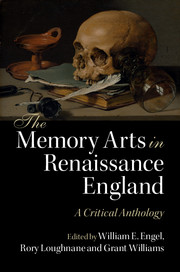Book contents
- Frontmatter
- Dedication
- Contents
- List of figures
- Acknowledgements
- A note on abbreviations
- Introduction
- PART I The art of memory
- PART II Rhetoric and poetics
- PART III Education and science
- PART IV History and philosophy
- PART V Religion and devotion
- PART VI Literature
- Introduction to Part VI
- POETRY
- VI.1 John Skelton, ‘Upon a Dead Man's Head’ (1527)
- VI.2 Edmund Spenser, The Faerie Queene (1590)
- VI.3 Anthony Sherley, Wit's New Dial (1604)
- VI.4 Richard Niccols, Mirror for Magistrates (1610)
- VI.5 Abraham Holland, ‘A Funeral Elegy’ (1626)
- VI.6 George Herbert, The Temple (1633)
- VI.7 Francis Quarles, Emblems (1635)
- VI.8 Mary Fage, Fame's Rule (1637)
- VI.9 Margaret Cavendish, selected works
- VI.10 John Milton, Paradise Lost (1674)
- PLAYS AND PROSE
- Index
- References
VI.6 - George Herbert, The Temple (1633)
from POETRY
Published online by Cambridge University Press: 05 August 2016
- Frontmatter
- Dedication
- Contents
- List of figures
- Acknowledgements
- A note on abbreviations
- Introduction
- PART I The art of memory
- PART II Rhetoric and poetics
- PART III Education and science
- PART IV History and philosophy
- PART V Religion and devotion
- PART VI Literature
- Introduction to Part VI
- POETRY
- VI.1 John Skelton, ‘Upon a Dead Man's Head’ (1527)
- VI.2 Edmund Spenser, The Faerie Queene (1590)
- VI.3 Anthony Sherley, Wit's New Dial (1604)
- VI.4 Richard Niccols, Mirror for Magistrates (1610)
- VI.5 Abraham Holland, ‘A Funeral Elegy’ (1626)
- VI.6 George Herbert, The Temple (1633)
- VI.7 Francis Quarles, Emblems (1635)
- VI.8 Mary Fage, Fame's Rule (1637)
- VI.9 Margaret Cavendish, selected works
- VI.10 John Milton, Paradise Lost (1674)
- PLAYS AND PROSE
- Index
- References
Summary
About the author
George Herbert (1593–1633), university orator at Cambridge, became a deacon and later canon of Lincoln Cathedral, and finally rector of Bemerton, where, as an ordained priest in the Church of England, he served until his death three years later.
About the text
The poems making up The Temple were collected by Nicholas Ferrar who entrusted them to the university printer at Cambridge. It went through thirteen editions by 1709, the seventh including an index ‘for ready finding out chief places’ typical of those in emblem books and collections of commonplaces (Herbert himself had gathered over a thousand proverbs and epigrams, published posthumously 1640).
The Temple is organised into three sections: ‘The Church Porch’, ‘The Church’ (having the same number of poems as the number of psalms as divided up for liturgical use in the Church of England calendar) and ‘The Church Militant’. The first part reflects the worldly wisdom required for crossing the threshold to personal faith; the middle section, containing the bulk of the poems, activates the cathartic dynamism associated with dialogue and drama; the last part concerns portents and prophecy, mirroring the Bible's conclusion – and, by extension, that of each individual and of the Church itself – with its promise of certain judgement.
One hundred and sixty-four poems comprise the whole, balanced in chiastic equipoise, with two single poems on either end. A preliminary distich of warning (‘Superliminare’) accompanies ‘The Church Porch’, recalling inscriptions found on entry lintels admonishing those who enter to do so only after having cleared away all remnants of the profane. Appended to ‘The Church Militant’ is a reminder (‘L'Envoy’) to retain and reflect on the rich variety of what one has found within. Poems echo one another in numerous and often unexpected ways, even as they set up harmonic resonances among scriptural passages, especially as regards the various implications of the term ‘temple’. Specifically it refers to the Old Testament place of worship (accounting for ‘The Altar’ as the first poem of ‘The Church’ sequence, with its explicit theme of sacrifice); second, scriptural allusions concerning the New Testament transformation of the temple as a symbol for Christ; third, the Christian church as the symbolic successor of the Old Testament temple as the place where one encounters God; and finally, biblical precedents that underwrite the New Testament view of the human body as God's temple (1 Cor. 6:16–19).
- Type
- Chapter
- Information
- The Memory Arts in Renaissance EnglandA Critical Anthology, pp. 299 - 305Publisher: Cambridge University PressPrint publication year: 2016

